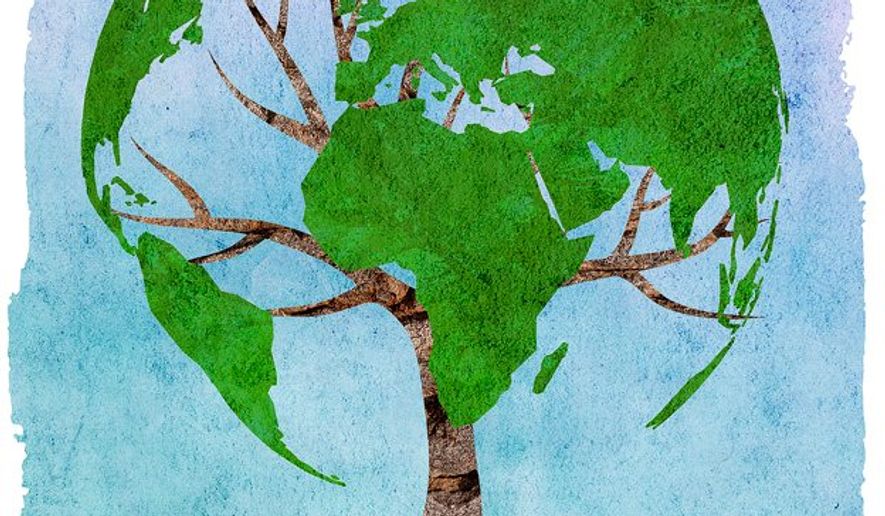OPINION:
While the American public continues to debate the ways in which to tackle the consequences of climate change, the first lady of Azerbaijan is quietly pursuing a tactic that can become a global model for how to address CO2 emissions without politicizing the issue; namely, planting trees.
When I first visited Azerbaijan in 1990, I witnessed a country whose environment was devastated by the Soviet Union (Azerbaijan gained its independence in 1991). I recall having difficulty breathing due to high levels of pollutants in the air and even boiling water from the Caspian Sea in order to make myself a cup of tea. The road from the airport to the center of Baku, the capital, was devoid of any trees and instead one could only see “lakes” of crude oil on the surface. Sadly, central planners in Moscow had robbed this secular Muslim nation of 9 million of its beautiful landscape, including its trees.
Today, thanks to the efforts of Mehriban Aliyeva, Azerbaijan is making an “environmental comeback” by planting trees in every open space possible. The drive from the airport to the center of Baku is now filled with lovely trees. Yet, beyond this reversal in the fortunes of Azerbaijan’s environment, this visionary first lady is also showing the world how to tackle climate change without sensationalizing the issue and in the process to protect our planet from the dangers of CO2 emissions. As trees grow they help stop climate change by removing carbon dioxide from the air, storing carbon in trees and soil and releasing oxygen into the atmosphere. Indeed, the Swiss Federal Institute of Technology (Switzerland’s MIT) estimates that once these trees have matured they could store 225 billion tons of carbons or about two-third of the 330 billion tons that humans have released into the atmosphere since the Industrial Revolution.
In Azerbaijan, tree planting is not only a way in which to tackle the environmental degradation left over from the Soviet times, but is also directly related to public health. According to Harvard University environmental health expert Linda Tomasso, tree planting has enormous health benefits and can mitigate the link between air pollution and lung disease. Not surprisingly, in Azerbaijan efforts are underway to plant large-leaved trees that have more surface area for leaves to filter noxious particles from the air.
And yet another factor motivating the first lady of Azerbaijan to plant trees is economic. Hiring locals to plant, maintain and oversee the trees can provide a decent income. A local Azeri NGO, IDEA, views tree planting as good for youth empowerment and not surprisingly Coca-Cola has partnered with ADA University of Azerbaijan to plant 100,000 trees by 2020. Validation of Mehriban Aliyeva’s tree planting initiatives and their global impact on job creation is borne out by the U.S. charity Eden Projects, which recently celebrated planting 2.2 million trees in Mozambique. According to its CEO, Steve Fitch, tree planting has increased local village employment and helped “at risk” youth.
The global implications of Mehriban Aliyeva’s tree planting campaign may not be immediately obvious but are potentially enormous. For example, weak and failing states in such places like Yemen, Syria, Afghanistan and the African sub-continent oftentimes produce conditions in which jobless young men become radicalized. The fundamental economic benefit that accrues in the process of tree planting can lay the foundation for sustainable job growth. In the case of Muslim nations facing deforestation, food insecurity and “at risk” youth, tree planting can become a possible alternative to joining criminal gangs and terrorist organizations like ISIS and al Qaeda. Paying “at risk” young Muslim men and women to plant and maintain trees in the name of the Prophet Muhammad can become a game-changer in the war against radicalism.
A further implication of Mehriban Aliyeva’s tree planting campaign is its potential to foster religious tolerance, understanding and cooperation on a global scale. All the major religions of the world have references to and encouragement for planting trees as a gift to God. For example, tree planting, Tu Bishvat, has always been held in high regard in Judaism. And there are many references in the Koran and Hadith (words of the Prophet Muhammad) about planting trees in the name of Allah. In the Bible (Genesis 2:9), reference is made to trees as being “good for food.” A global tree planting campaign as a gift to God can bring peoples of disparate faiths and beliefs together. According to the Vos Foundation, it costs no more than 10 cents to plant a tree and therefore by extension, planting 1 trillion trees would cost $100 billion, a fraction of the more than $6 trillion sum currently held by the top 10 sovereign wealth funds of the world.
The Book of Proverbs tells us: “Where there is no vision the people perish.” The first lady of Azerbaijan has laid out a vision for how we can protect our planet. It is time for world leaders to implement this common sense solution to climate change by planting trees around the world and in their own backyards.
• S. Rob Sobhani is CEO of Caspian Group Holdings.




Please read our comment policy before commenting.